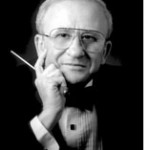By David Amos
 SAN DIEGO –I have recently written about the relationship of composer and conductor, or a composer and any soloist who needs guidance as to how to perform the music at hand.
SAN DIEGO –I have recently written about the relationship of composer and conductor, or a composer and any soloist who needs guidance as to how to perform the music at hand.
When the composer is no longer with us, as it is in most cases of music being performed today, the situation is clear; our knowledge on how to interpret the music correctly is based on our experience, the listening of the music, tradition, and above all, the study of the musical score. For Arturo Toscanini, and for many artists, the latter was the ultimate source of information.
But, what about living composers? Obviously it is best having them present for rehearsals preceding live concerts, or at recording sessions. But this isn’t always what happens.
Just last month, I conducted a concert where we were privileged to have three composers whose music we were playing with us present in the audience, namely Michael Kibbe, David Yeagley, and Arkady Luxemburg. In this instance, it was very gratifying to have them with us, offering their valuable insights in the rehearsals preceding the concerts.
Most composers really want to be present, to suggest, correct, and influence interpretation. After all, who would know the music better than its creator? But many performers would rather have the composer far away when the music-making begins. Let me explain.
I have conducted in concerts and recordings many works of living composers, and through my experience with them, combined with various conversations, there are some interesting stories to relate.
The presence of a composer can enhance the final performance, or totally distort it, depending on the chemistry of the people involved. Composers whose music I have recorded, such as David Ward-Steinman and Arnold Rosner, understand perfectly the dynamics of recording sessions and their time restrictions, and were of tremendous help during the times we have worked together under the pressures of limited rehearsal and recording times. The final product was definitely better because of their being there.
In contrast, when I recorded the music of “Composer X”, who insisted on being at the recording sessions with the London Symphony Orchestra, I dreaded the moment. Why? Because I knew that he would become so picky and detailed, that time would be meaningless to him, we would fall hopelessly behind in the recording time allowed, and the whole project might be at risk. The idea that time is money, and that the time allotted to record his music would be three hours and not a minute more, would not be in his agenda. I strategically placed his work to be recorded at the last session in order not to endanger the other works on that album. Thankfully, he forgot to come to the session. Problem solved.
Composer Miklos Rozsa told me the story that in the 1950’s violinist Jascha Heifetz was going to record his Violin Concerto. He was honored and thrilled. But he was also hurt when Heifetz recorded the concerto without telling him when or where, although they both lived in Los Angeles, and the recording took place in the same city. When you are Heifetz, I suppose you can do that.
I have had a composer sitting next to me at a rehearsal while I was conducting his music, tugging at my shirtsleeves every few minutes, asking me to change this or that. Patience.
In turn, when I was ready to record the music of Norman Dello Joio and Morton Gould, and it was physically impossible for them to be at the recording sessions, we sat together for a long time, and I was given detailed explanations as to their artistic intentions. This was a good team effort, and it worked out very well.
Composer Alan Hovhaness’ approach was very different. A spiritual man, he simply told me, “You have the score in your hands; I composed it, and from this point on, you can decide what you want to do with it”.
Composer Peter Schickele (of PDQ Bach fame) told me this amusing story of something that happened to him: He was coaching a string quartet in the preparation to perform one of his serious works. At one point in the rehearsal, one of the violinists turned toward him and said, “Of course, you realize that we prefer our composers dead!”
While I was conducting a recording of a concerto with the Israel Philharmonic in the 1980’s, the composer was present. He was most cooperative and surprisingly accommodating. But, a funny thing happened after the recording sessions were finished. During the playback, we were listening to the unedited material which we recorded the previous days we caught one note that was played wrong, which was overlooked by all of us, conductor, soloist, composer, and producer. What to do? Simple. The composer took an eraser, deleted the right note from his score, and wrote in the wrong note. Problem solved.
On the subject of composers conducting their own music, this is worth a dedicated column. And, I believe that I have already written on this.
*
Amos is conductor of the Tifereth Israel Community Orchestra and has guest conducted professional symphonies around the world.
Given the choice, I feel that it is preferable to have the presence of the creator of the music, and the results will be better. But, as you see, each situation is different, and it requires strategy, planning, and at times, a non-traditional approach.